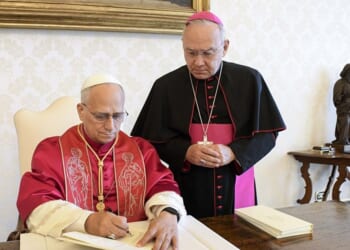Last Thursday, families who lost relatives in the crashes of two Boeing 737 aircraft petitioned the Fifth Circuit to reinstate the criminal charge against Boeing. In two petitions I filed, the families asked the Circuit to reverse District Judge O’Connor’s approval last week of the Justice Department’s motion to dismiss the conspiracy case against Boeing. The petitions explained that the Department violated the Crime Victims’ Rights Act (CVRA) by not fully conferring with the families about its dismissal plans—and by concealing a deferred prosecution agreement (DPA) from the families in the initial phases of the case. The petitions also argue that Judge O’Connor failed to fully assess whether dismissing the case was in the “public interest.” Today, the Fifth Circuit consolidated the two petitions and ordered the Justice Department and Boeing to respond. In this post, I set out the case’s current procedural posture and then the families’ arguments.
I’ve blogged about the Boeing criminal case a number of times before, including here, here, and here. In a nutshell, Boeing lied to the FAA about the safety of its 737 MAX aircraft. The Justice Department charged Boeing with conspiracy for these lies, but then immediately entered into a DPA to resolve the criminal case. In subsequent litigation, the families proved that the 346 passengers and crew on board the two doomed 737 MAX flights were “crime victims” under the CVRA—they had been directly and proximately harmed by Boeing crime. This makes Boeing’s conspiracy crime the “deadliest corporate crime in U.S. history,” as Judge O’Connor described it.
In the most recent proceedings, the Justice Department moved to dismiss its earlier-filed charge against Boeing in favor of resolution through a non-prosecution agreement (NPA). Earlier this month, I blogged about Judge Reed O’Connor (U.S. District Court for the District of the Northern District of Texas) granting the Justice Department’s motion. In his order, Judge O’Connor essentially agreed with many of the factual objections that I have made for the families who lost loved ones because of Boeing’s crime. But, reluctantly, Judge O’Connor dismissed the charge, concluding that he lacked a legal basis for blocking the Department’s ill-conceived non-prosecution plan.
Last week, the victims’ families filed two challenges to the dismissal. I’ll focus here on the petition challenging the NPA. A related petition challenges the earlier DPA reached in the case because of the Department’s CVRA violations. Here’s the introduction to the families’ petition challenging the NPA (some citations omitted):
A year-and-half ago, many of the same victims’ families filing this petition came to this Court in the same underlying criminal case—seeking enforcement of their CVRA rights and justice for Boeing criminally killing hundreds. See In re Ryan, 88 F.4th 614 (5th Cir. 2023). Following oral argument, this Court denied their petition as “premature,” explaining that if and when “judicial approval is sought to resolve the instant case, the district court has an ongoing obligation to uphold the public interest and apply the CVRA.” Id. at 627.
Last week, the district court made its decision on resolving the charge below, approving the Government’s motion to dismiss the pending conspiracy charge against Boeing. The district court’s decision essentially confirmed this Court’s prophetic fear that this case’s “ultimate outcome as approved by [a] federal court, means no company, and no executive and no employee, ends up convicted of any crime, despite the Government and Boeing’s … agreement about criminal wrongdoing leading, the district court has found, to the deaths of 346 crash victims.” 88 F.4th at 627.
Now that the issues are no longer “premature,” this Court should intervene to protect both the victims’ families’ CVRA rights and the broader public interest. In granting dismissal, the district court failed to protect the families’ CVRA rights, including their rights to reasonably confer and to be treated with fairness. The Government’s alleged “conferral” conference calls with the victims’ families were perfunctory exercises—lacking in any actual substantive conferring and hiding from the families critical features about the dismissal. Because of these unaddressed CVRA violations, this Court should reverse the district court.This Court should also reverse because the district court misunderstood this Court’s precedents regarding the need to protect the public interest when reviewing dismissal motions. The district court seemed to construe this Court’s precedents as requiring it to approve the Government’s motion to dismiss so long as the prosecutors had “not acted with bad faith” and had “given more than mere conclusory reasons” for the dismissal.” Op. at 9. But this parsimonious reading ignored this Court’s prior instructions in this very case—that under “Supreme Court and prior Fifth Circuit precedent … district judges are empowered to deny dismissal when clearly contrary to manifest public interest …” and that thus district judges will “vigilantly … enforce the public interest.” Ryan, 88 F.4th at 626-27 (internal citation omitted).
Here, the district court found that the victims’ families provided “compelling” reasons to deny the dismissal. Id. at 8. And yet, the district court reluctantly concluded that it was somehow required to give its approval to an agreement that “fails to secure the necessary accountability to ensure the safety of the flying public.” Op at 6. In other words, the district court thought it had no choice but to lend its imprimatur to the dismissal. The district court was wrong. It had the power to reject the stunning injustice inherent in simply dismissing the charge for “the deadliest corporate crime in U.S. history.” To protect the manifest public interest, this Court should reverse.
One of the most important parts of this petition is its challenge to the Justice Department’s unprecedented approach of entering into a binding non-prosecution agreement with Boeing before securing district court approval for its motion to dismiss. I’ve blogged about this important issue in two earlier posts, here and here. The families’ petition explains why the Fifth Circuit should reverse to protect the long-standing practice of judicial review of Justice Department dismissal motions:
The district court’s approval of the Government’s “unprecedented” no-further-
prosecution provision effectively guts Rule 48(a). Even before the district court ruled, the Government and Boeing had devised an agreement in which the Government promised not to further prosecute Boeing—even if the district court thereafter denied the motion to dismiss. Never before in Rule 48(a)’s eighty-year history has the Government entered such a preemptive agreement—much less received after-the-fact judicial approval for its ploy. In Ryan, this Court recounted that any contractual agreements, such as NPAs, “derogate neither court authority nor statutory rights.” 88 F.4th at 625. But if this Court approves the Government’s contractual end-run around Rule 48(a), this scheme will no doubt “become the blueprint for all future dismissal motions in federal criminal prosecutions.” This disturbing subterfuge alone renders the Government’s dismissal motion clearly contrary to manifest public policy—the long-standing public policy provided by Rule 48(a) of judicial review before the Government can terminate a prosecution.
The latest status is that the Fifth Circuit today entered a brief procedural order. The Circuit consolidated the two petitions and directed the Justice Department and Boeing to respond to the families’ petitions by December 17. I then have three weeks to respond.
I hope that the Fifth Circuit will ultimately rule in favor of the victims’ families and block the miscarriage of justice that would result if the deadliest corporate crime in U.S. history simply goes unpunished.















